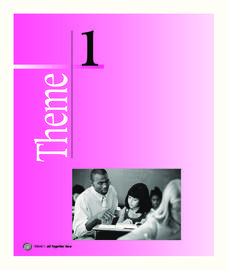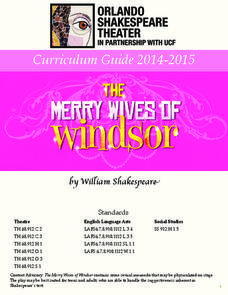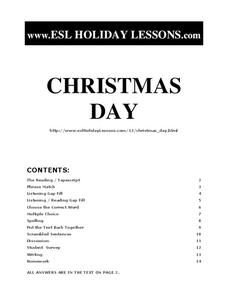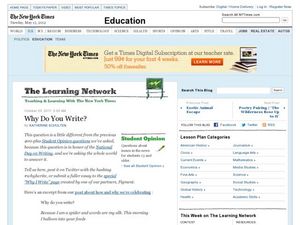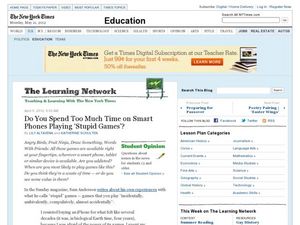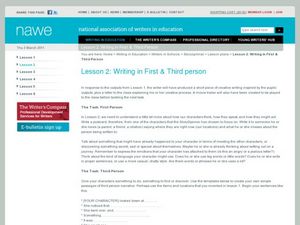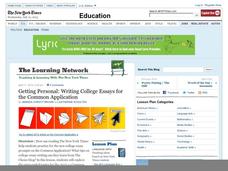Scholastic
My Favorite Activity (Grades K-2)
Scholars discuss the many ways they use persuasion in their everyday lives and brainstorm specific ideas for encouraging someone to do something. With the list of persuasive techniques they made, young writers complete a graphic...
Houghton Mifflin Harcourt
All Together Now: Challenge Activities (Theme 1)
For scholars who need a challenge in the classroom, here is a unit for you. Learners explore topics such as animals, sports, helpers at home, the past, and funny things that have happened in their lives. Youngsters also engage in writing...
Curated OER
Teaching Julius Caesar: A Differentiated Approach
While the themes of Julius Caesar may appeal to most readers, the act of reading the play can be a challenge. A unit plan related to the popular play by Shakespeare provides lesson plans and activities designed for differentiated...
Orlando Shakes
Merry Wives of Windsor: Study Guide
What does the character Falstaff mean when he says "I was beaten myself into all the colors of the rainbow"? Using the Merry Wives of Windsor curriculum guide, scholars unlock meaning by paraphrasing lines from the play. Pupils also...
Orlando Shakes
Henry V: Study Guide
Shakespeare did more than write timeless literary works—he coined words such as moonbeam, fortune-teller, and even eyeball! A study guide for Henry V introduces key words the Bard first used with a fun vocabulary activity, part of a...
ESL Holiday Lessons
Christmas Day
Celebrary the holiday season fluently with a packet designed for English learners. The resource includes reading comprehension, spelling, scrambled sentences, and writing worksheets focused around Christmas.
Nosapo
Body Language
When it comes to learning a language and literacy, understanding nonverbal communication is often as important as verbal communication. An interactive body language activity incorporates role play to demonstrate the difference between...
University of North Carolina
Qualifiers
A lot of writers really struggle very much with adding a lot of qualifiers and intensifiers in their writing. Part of a larger series to improve writing skills, a handout on the topic provides tips to help reduce a reliance on these...
EngageNY
Writing the Children’s Book: Day One
With a brief mini-lesson plan, scholars learn about using strong verbs, sensory details, and precise descriptions. Next, pupils continue working on their children's book storyboards before choosing their strongest pages for peer critiques.
Curated OER
Paragraph Structure
Make sure your writers have the buns and the meat in their paragraph burgers with paragraph exercises. The resource gradually leads up to individuals writing their own paragraphs, starting with identification exercises, moving on to a...
Nosapo
Introduction Questions
What country are you from? What is your favorite food to cook? What is your favorite sport to watch? Pupils practice English and learn more about their classmates with a set of conversational questions.
Learning Station
Writing Playscripts
In this writing worksheet, students read a short description of a play script. Then, students read a fable and write a play script of the fable.
Curated OER
Why Do You Write?
Ask your learners this question as a quickwrite: why do you write? This prompt can begin a unit on writing and open up a dialogue about the motivations writers have. Tap into your scholars' reasons for writing and make the activity more...
K12 Reader
Why Do We Need Pronouns?
Who needs pronouns? Everyone! Show your class the power of pronouns with this learning exercise. Learners read a sample paragraph that doesn't include any pronouns and then revise that paragraph by filling in the appropriate pronouns.
Curated OER
Student Opinion: Do You Spend Too Much Time on Smart Phones Playing 'Stupid Games'?
This versatile resource from The New York Times website provides a short opinion piece on smart phones and the amount of time we spend playing games on them as well as several possible writing prompts pupils could consider in response to...
Curated OER
Writing in First and Third Person
Explore narrative writing by participating in a role-playing activity. In this perspective lesson plan, learners define first and third person in writing and discuss how it changes the mood of the reader. The first activity has pupils...
Gourmet Curriculum Press
Author's Purpose
Who knew determining author's purpose could be turned into a game? Four teams compete to correctly identify the author's purpose for writing a series of passages.
Scholastic
Writing Letters to the Chancellors of the Academy of American Poets
To celebrate National Poetry Month, young writers focus on the role letter writing has played in the development of poets. They begin by journaling three to five associations to a writing prompt that requires them to identify their...
Nosapo
Writing Prompt: Write About a Photo
Practice descriptive writing with a prompt that includes a photograph. Writers craft the whole story of the single second caught in a photo using the provided questions to prompt their imaginations.
Curated OER
Write Some Dialogue
Students write dialogue. For this character development lesson students use direct or indirect speech to include a confrontation between two characters in their story. Students portray the emotions of the characters in addition to what...
The New York Times
Getting Personal: Writing College Essays for the Common Application
Develop an understanding of the open-ended questions that are a part of the college Common Application. Future college learners collaborate, discuss prompts acquired from the application, and philosophize on their plan of attack for the...
Curated OER
Six Traits of Writing
What are the six traits of writing? This cute presentation will show you and your pupils exactly that! For each trait of writing, the creators of this PowerPoint included a quote and bullet points describing the trait. Play this and have...
Curated OER
Apple Orchard Dramatic Play
Students set up a pretend "apple stand." In this dramatic play lesson, students create an apple stand scene. Students pretend to pick and pay for apples.
Shakespeare Globe Trust
Much Ado About Nothing
Love, deception, witty bante—that's much ado about a lot! As learners navigate the resource, they view an interactive character map and read character biographies from Shakespeare's Much Ado About Nothing. Pupils also listen to...



